The most recent survey also found that nearly half of all voters say the congressional redistricting process is "not fair at all" though many are unsure of the details of the process.
FULL REPORT with METHODOLOGY & CROSSTABS
More than eight out of 10 registered voters in North Carolina can identify Mike Pence at U.S. vice president and Roy Cooper as N.C. governor, with the state's two U.S. senators and local sheriffs among the more identifiable politicians around the state, according to the latest Elon University Poll.
But at the other end of the spectrum, only one in nine know that state Sen. Phil Berger is the leader of the N.C. Senate and only one in 11 can identify Tim Moore as speaker of the N.C. House, demonstrating a large gap between awareness of federal political leaders and of many of those making the decisions at the state level, the Elon Poll found.
The results were part of a broad survey seeking to assess the level of political knowledge in North Carolina, with registered voters asked to identify a list of elected leaders who represent them in Raleigh and Washington, D.C. Members of Congress were more identifiable than those who represent N.C. citizens in the state’s General Assembly. When asked which party controls the majority of the seats in the General Assembly, 86 percent were able to correctly state the Republican Party, though voters were less likely to be able to correctly estimate what percentage of state legislators are women or are white.
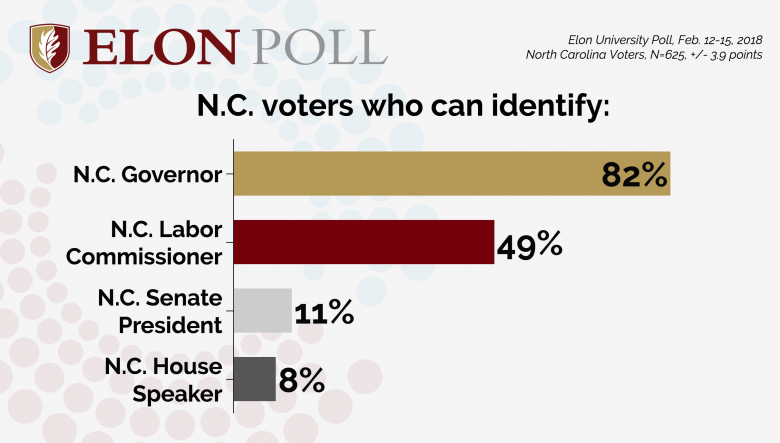 “Being able to identify the names of our local officials is a very basic, yet essential step for an individual to be civically engaged,” said Jason Husser, director of the Elon University Poll and assistant professor of political science. “Perhaps a sign of the times, most North Carolina voters are much better informed about their leaders in Washington than their leaders in Raleigh. Importantly, the biggest state policy changes that could result from this year’s election cycle depend on the number of General Assembly seats held by one party or the other. While reassuring that most voters know which party controls the two chambers of the General Assembly, the vast majority are unable to identify the names of their local state legislators and the state’s most important legislative leaders.”
“Being able to identify the names of our local officials is a very basic, yet essential step for an individual to be civically engaged,” said Jason Husser, director of the Elon University Poll and assistant professor of political science. “Perhaps a sign of the times, most North Carolina voters are much better informed about their leaders in Washington than their leaders in Raleigh. Importantly, the biggest state policy changes that could result from this year’s election cycle depend on the number of General Assembly seats held by one party or the other. While reassuring that most voters know which party controls the two chambers of the General Assembly, the vast majority are unable to identify the names of their local state legislators and the state’s most important legislative leaders.”
Asked about the controversial redistricting process through which congressional districts are mapped, about half of registered voters could say who draws the district lines, but only about one in four could say when redistricting occurs. Nearly half — 47 percent — said the way congressional lines are drawn is “not fair at all,” while 27 percent said they either hadn't thought about it or didn't know.
The live-caller, dual-frame (landline and cell phone) survey of 625 registered voters in North Carolina was conducted Feb. 12-15, 2018. Survey results in this news release have a margin of error +/-3.9 percent.
Political knowledge
For the survey, registered voters were offered the name of an elected official who represents them in government, and were then asked to identify the particular office that person holds. For instance, respondents were given the name of Mike Pence, and were asked to name his elected office — U.S. vice president.
Knowledge of federal and statewide elected officials was noticeably higher than the knowledge of other North Carolina officials, such as the leaders of the N.C. General Assembly (Senate President Pro Tempore Phil Berger and House Speaker Tim Moore), or of voters’ own representatives serving in the N.C. Senate or N.C. House.
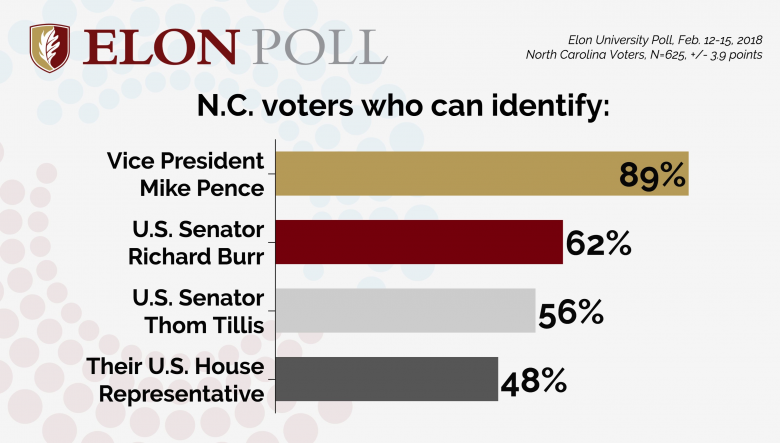
For instance, while 89 percent correctly identified Pence at vice president, a smaller portion could identify Richard Burr (62 percent) and Thom Tillis (56 percent) as North Carolina’s U.S. senators. About half (48 percent) could identify the member of the U.S. House representing their district.
Statewide officials in North Carolina fared better than those elected to represent only a portion of the state. Roy Cooper was identified as N.C. governor by 82 percent of voters, second only to Mike Pence. N.C. Commissioner of Labor Cherie Berry, whose picture is mounted in elevators around the state, was identified by 49 percent of voters. For Berry, her unofficial titles of “Elevator Lady” or “Elevator Queen” were accepted as a correct answer, with those unofficial names offered by a majority of those who answered correctly.
Given the omnipresent name and photo of Berry in elevators, it makes sense that urban voters (those presumably using elevators on a more regular basis) were more likely to recognize Berry’s name than those voters in rural areas by a margin of 59 to 44.
Leaders of both chambers of the Republican-controlled legislature were considerably less well-known by N.C. voters despite the considerable power they have in setting the legislative agenda. Phil Berger, an Eden Republican, was identified as the leader of the N.C. Senate by 11 percent of voters. Eight percent of voters knew that Tim Moore, a Republican from Kings Mountain, is serving as speaker of the House.
Though both Berger and Moore are Republicans, they were less recognizable to fellow members of their political party. Sixteen percent of Democrats correctly identified Berger’s role in the legislature compared to 5 percent of Republicans. For Moore, 11 percent of Democrats identified him as House speaker while 6 percent of Republicans were able to.
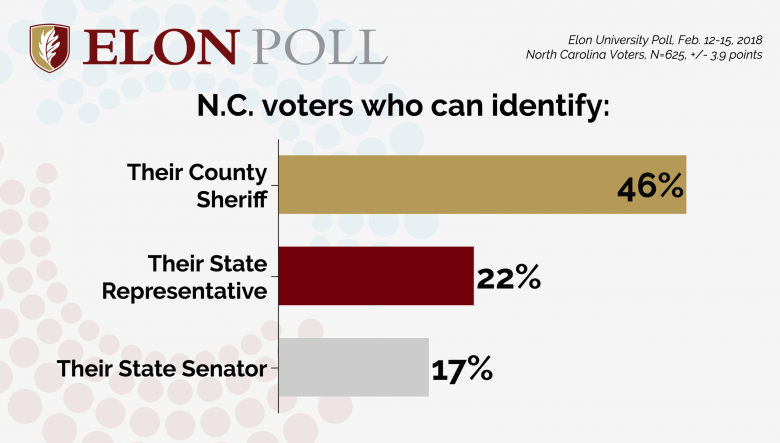
Other members of the legislature fared slightly better than Berger and Moore, with state senators identified by 17 percent of voters in their district and state representatives identified by 22 percent of voters within the districts they serve. Democrats generally did a better job of identifying their local state senator or representative than Republicans, and those with more education were more aware of who was representing them in Raleigh than those with less. Suburban voters, Democrats and Baby Boomers (those born between 1945 and 1964) were all the most likely to be able to say that Republicans hold the majority in both chambers of the N.C. General Assembly.
County sheriffs, the only local elected official included in the survey, are among the better-known politicians asked about by the Elon Poll, with nearly half of voters — 46 percent — able to identify this top local law enforcement officer. Rural voters were much more likely to be able to identify their sheriff than urban voters by a 57 to 35 percent margin. Interestingly, educational attainment appears to play a factor, with 55 percent of those with only a high school education able to identify their sheriff compared to 40 percent of those voters with advanced college degrees.
To offer points of comparison, the Elon Poll also sought to measure knowledge about North Carolina sports figures. Cam Newton, quarterback for the Carolina Panthers, was correctly identified by 77 percent of voters, while 54 percent were able to identify Roy Williams as the coach of the University of North Carolina men’s basketball team and 53 percent knew Mike Krzyzewski as head coach of the Duke University men’s basketball team.
While one may see these results as suggesting that North Carolina has particularly low-levels of political knowledge, Husser discourages this interpretation. Rather he believes these results as largely consistent with a broader national pattern rather than an issue specific to North Carolina.
“Taken out of context, the results of our survey show North Carolina as a state with worrisome deficiencies in political knowledge,” Husser said. “However, our findings track a broader national pattern that is not at all isolated to the Old North State. Surveys about local knowledge are rare, making comparisons between North Carolina and the rest of the country difficult. In general, though, it seems North Carolina should worry little that we are falling behind other states, but we also are unable to justify any special pride in our voters having high levels of civic knowledge.”
For example, a series of Pew surveys found that less than half of the American public can correctly answer whether Republicans hold a majority in the U.S. House of Representatives. Paralleling the Elon Poll’s findings for North Carolina, a 2007 Pew study reported that while 62 percent of Americans could identify the job of NFL player Peyton Manning, only 15 percent could identify the job of then-U.S. Senate leader Harry Reid.
Redistricting
Redistricting — the process by which the geography of congressional districts is periodically updated to reflect changes in population — has generated a lot of recent attention following court challenges to the process, which some charge is overly political and is disenfranchising voters. North Carolina’s redistricting process is one of those now being challenged, with the U.S. Supreme Court in January blocking a lower court’s order for the state to rework its congressional map, due to what was judged to be partisan gerrymandering.
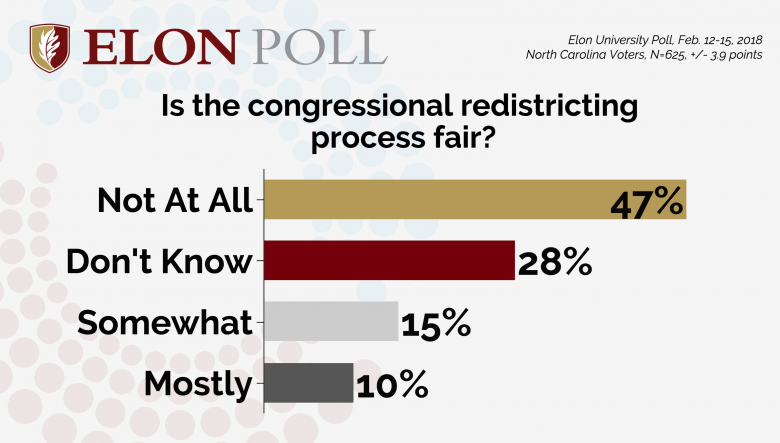
The Elon Poll sought to gauge the knowledge that N.C. voters have of the redistricting process and their thoughts about whether the process is fair. Nearly half — 46 percent — correctly answered that the N.C. General Assembly oversees the drawing of congressional districts, but only 25 percent knew that the process takes place every 10 years after the U.S. Census. Only 15 percent of voters were able to answer both questions correctly.
Those with more education and those living in urban areas were generally more knowledgeable about the redistricting process, and Democrats were more likely to know who oversees redistricting and when it occurs than Republicans.
Asked whether the process was fair, almost half — 47 percent — said it is “not fair at all,” compared to 10 percent who said it was “mostly” fair and 15 percent who said it was “somewhat fair.” Another 27 percent said they didn't know whether the process was fair. Husser notes that respondents received this question after the battery of knowledge questions, so there is likely a significant question order effect. Among respondents who correctly answered both redistricting knowledge questions, three-quarters believe the redistricting process is not fair.
“Who does redistricting? When does it typically happen? Knowing the answers to these two questions seems to me as the basic prerequisite for meaningful conversation about the complex topic,” Husser said. “However, less than one of every six registered voters could answer both questions correctly. This suggests that the North Carolina public still needs more time before any public consensus emerges in a state that has become central to the national debate about gerrymandering.”
Digging deeper, the poll found that members of Generation X and Baby Boomers (those between the ages of 37 and 73) believe that the process is “not fair at all,” and blacks were more likely to hold that belief than whites. Democrats, now the minority party in the legislature with limited say in the drawing of congressional districts, were more likely to say the process is not fair than Republicans by a margin of 69 to 15. Twenty-one percent of Republicans say the process is “mostly” fair compared to 4 percent of Democrats.
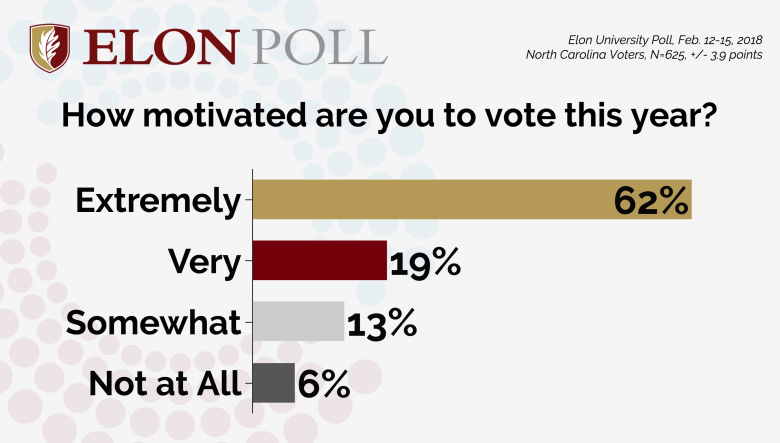
Looking ahead to this year’s elections, the poll has found that nearly two-thirds of N.C. voters (62 percent) are “extremely” motivated to cast a ballot on Election Day, with 72 percent of Democrats holding that view compared to 59 percent of Republicans and 55 percent of independent voters.
Older voters — those born before 1964 — are the most motivated to vote, with 73 percent of Baby Boomers and 72 percent of the members of the Silent Generation (born before 1945) saying they are “extremely” motivated. That compares to 65 percent of members of Generation X (born between 1965 and 1980) and 44 percent of Millennials (those born in 1981 and after).


